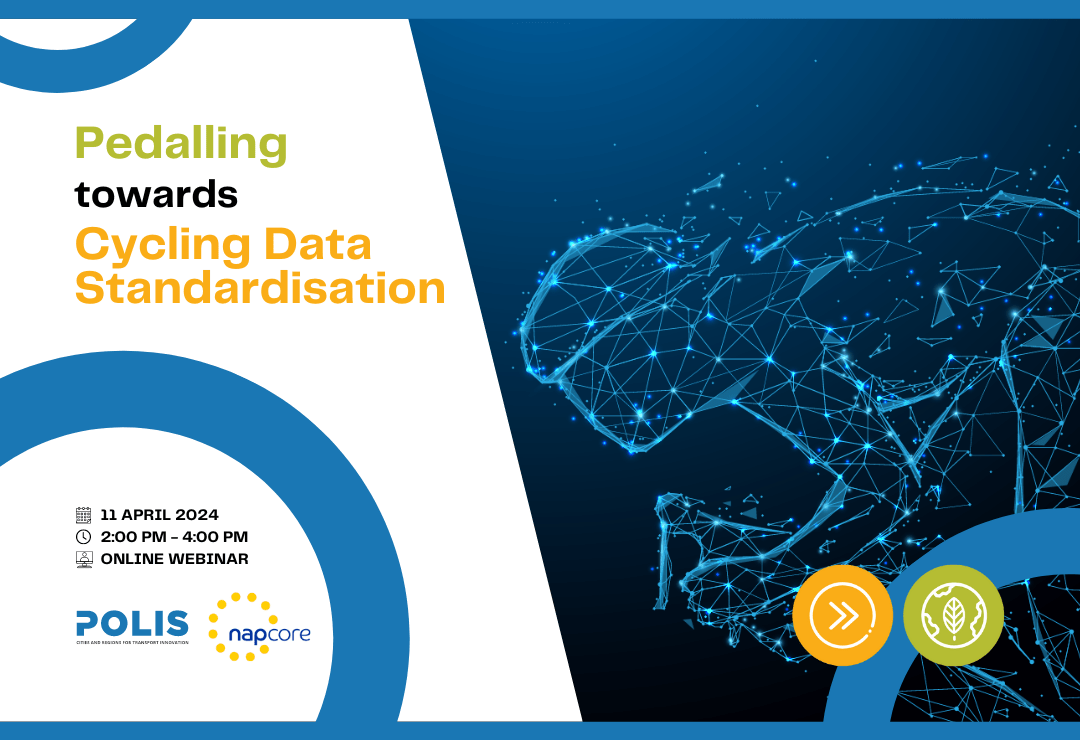Pedalling towards cycling data standardisation: Joint POLIS-NAPCORE webinar reveals all
On 11 April 2024, the POLIS Active Travel & Health and Traffic Efficiency Working Groups, together with the NAPCORE cycling ambassadors, organised a webinar to discuss cycling and the importance of data standardisation. Read more below!
Promoting multimodality and prioritising cycling as a feasible form of transport is essential to creating sustainable urban environments in today's rapidly changing urban landscape. This has been duly recognised by the European Union, which has recently adopted the European Cycling Declaration, marking a significant step in Europe’s quest towards reducing transport emissions.
However, this cannot occur without a fundamental component: data. Cycling’s importance is jeopardised when it is not well catered for and integrated into multimodal mobility systems due to a lack of thorough understanding of cycling patterns, usage dynamics, and infrastructure requirements.
To shed more clarity on this, on 11 April 2024 the POLIS Active Travel & Health and Traffic Efficiency Working Groups, along with the NAPCORE cycling ambassadors, organised a webinar on cycling data standardisation. Its aim? To bring the cycling community together and kick start open discussions surrounding standards, regulations, and other pertinent matters, specifically highlighting cities’ and regions’ needs, which are often left out of the conversation.
Cycling data: cities’ and regions’ perspective
Key insights that were gained from the webinar included illustrating some of the challenges faced by cities and regions concerning cycling data. Indeed, they often lack sufficient data specifically on active travel modes such as walking and cycling, highlighting the need for more capacity-building and clearer data-sharing models.
Cities like Copenhagen, which have already been collecting bike data for many years, have made interesting strides with initiatives such as BikeSim, estimating cyclists’ travel times through real-time data from traffic lights and sensors, or Variable Message Signs, which update automatically and help cyclists pick shorter and safer routes. However, they reiterated the need for real-time floating bike data, to better understand cycling patterns such as stops, origin and destination points, cyclist behaviour, and more, as well as their willingness to buy this data from other stakeholders who have better capacity and are already collecting cycling data.
Stakeholders for cycling data standardisation
Indeed, the webinar raised challenges also in convincing private companies to share data, with suggestions being made towards collaborative approaches between cities and stakeholders. Initiatives like the European Mobility Data Space (EMDS) aim to offer a platform for seamless data exchange and collaboration among diverse stakeholders.
As Europe pushes for cycling to be on the same level as other transport modes, NAPCORE presented their roadmap to build a community towards cycling data standardisation: from road managers to data providers to policy-makers, all kinds of stakeholders are necessary for this process, and a cycling data community can be fostered. The webinar also saw presentations from deployEMDS, IMEC, and Vianova, to hear their particular perspective on cycling data.
As POLIS and NAPCORE recently reinforced their collaboration towards advancing data provision in European cities and regions, stay tuned for further events as we build the cycling data community and continue down this journey to enhance cycling and sustainable transport systems across Europe.
